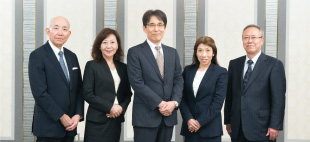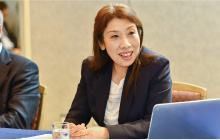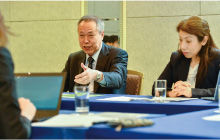
Special Project: Round-Table Talk with Outside Officers
Achieving sustainable growth and the higher corporate value by reflecting a diverse range of value in management
Opinions and suggestions about the development of the overseas business
Challenging task of strengthening the risk management of the overseas business by establishing a shared sense of value between Japan and countries overseas.
--Do you have any thoughts, suggestions, or advice regarding the overseas business the company is aggressively developing?
Suzuki:We are unlikely to see much expansion in terms of the scale of the domestic market, so that in a sense it is only natural for companies to move into growth markets such as China and the rest of Asia to maintain sustainable growth. However, the overseas business always involves risks that do not exist in the domestic business. This makes it important to take measures to address these risks and not overlook them.

Ichige:In my early days as an outside Audit & Supervisory Board member, I proposed preparing and using a checklist specifically related to risks in overseas investment to create a better sense of risk awareness. Shortly after that the checklist was prepared and came to be used as one of the tools for evaluating risks. However, because the business environment is constantly changing, gaps often arise between the initial recognition of facts and the actual situation after an investment is made. In order for the company to make decisions promptly and take appropriate measures in these situations, I think we need to implement a PDCA cycle that continuously monitors the overseas business situation and changes in the business environment.
Kawabata:Another key to strengthening the risk management of the overseas business is establishing a shared sense of value between overseas subsidiaries and the head office. A yellow light may be up at an overseas subsidiary, but the head office fails to notice it. On the other hand, the head office may be holding up a red light, but the overseas subsidiary plows through, believing that the light is still green. To establish a uniform level of risk awareness, it is important to cultivate skilled individuals at overseas subsidiaries.
Suzuki:As you said, I think it is important to develop the personnel system and give local employees at overseas subsidiaries opportunities to exercise their initiatives more in business operation. Most Japanese employees only have a few years of experience working at an overseas subsidiary, so it is difficult for them to identify local business risks without the help of local employees, who know local business practices and professional attitudes inside and out. In light of these factors, the mission of Japanese employees is to combine the knowledge, experience, and information of local employees with the corporate philosophy and know-how of AEON MALL created in Japan, and ensure that this philosophy firmly takes root.

Muramatsu:I agree. I visited China for a tax seminar about 15 years ago, and since then I have had a circle of contacts there. Through them, I have had the opportunity to look after young Chinese adults who come to study in Japan. They are very eager to learn, speak Japanese well, and think in an extremely logical fashion. It is important to hire many of these talented individuals and share the corporate philosophy of AEON MALL through the exchange of personnel and other means.
Taira:People also believe there is a high risk of accounting problems arising overseas due in part to difference in the tax system, the commercial code, and other laws. I think we need to develop a system that enables us to soundly control these accounting problems from Japan by visualizing them, instead of leaving them to be handled by overseas subsidiaries.
Suzuki:The heads of overseas subsidiaries are in a position to improve business performance by simply putting their foot on the accelerator. In that sense, we may need a mechanism that allows us to slam the brake from Japan.
Muramatsu:Speaking of the tax system in China, it has improved dramatically over the last 15 years, so I think the tax risk has lowered. That said, major differences in business attitudes can be seen in China and Japan. Thus, it’s important that we strengthen governance.


